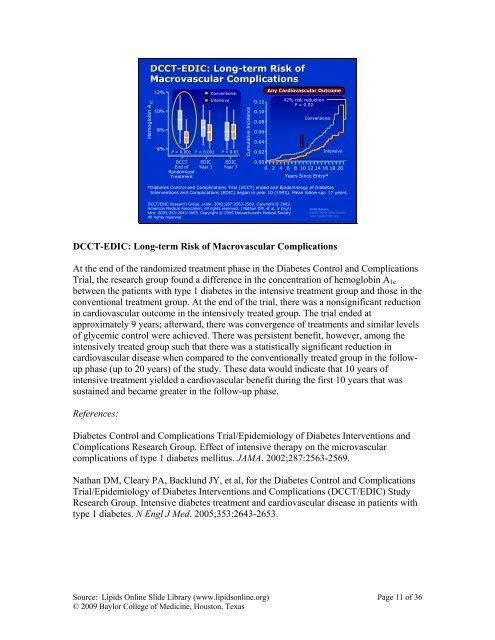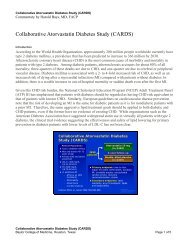Relationship of Glycemia to Cardiovascular Disease ... - Lipids Online
Relationship of Glycemia to Cardiovascular Disease ... - Lipids Online
Relationship of Glycemia to Cardiovascular Disease ... - Lipids Online
Create successful ePaper yourself
Turn your PDF publications into a flip-book with our unique Google optimized e-Paper software.
DCCT-EDIC:<br />
Long-term Risk <strong>of</strong><br />
Macrovascular Complications<br />
Hemoglobin A 1C<br />
12%<br />
10%<br />
8%<br />
6%<br />
Conventional<br />
Intensive<br />
P < 0.001 P < 0.001 P = 0.61<br />
Cumulative Incidence<br />
0.12<br />
0.10<br />
0.08<br />
0.06<br />
0.04<br />
0.02<br />
Any <strong>Cardiovascular</strong> Outcome<br />
42% risk reduction<br />
P = 0.02<br />
Conventional<br />
Intensive<br />
DCCT<br />
End <strong>of</strong><br />
Randomized<br />
Treatment<br />
EDIC<br />
Year 1<br />
EDIC<br />
Year 7<br />
0.00<br />
0 2 4 6 8 10 12 14 16 18 20<br />
Years Since Entry*<br />
*Diabetes Control and Complications Trial (DCCT) ended and Epidemiology <strong>of</strong> Diabetes<br />
Interventions and Complications (EDIC) began in year 10 (1993). Mean follow-up: 17 years.<br />
DCCT/EDIC Research Group. JAMA. 2002;287:2563-2569. Copyright © 2002<br />
American Medical Association. All rights reserved. | Nathan DM, et al. N Engl J<br />
Med. 2005;353:2643-2653. Copyright © 2005 Massachusetts Medical Society.<br />
All rights reserved.<br />
Slide Source<br />
<strong>Lipids</strong> <strong>Online</strong> Slide Library<br />
www.lipidsonline.org<br />
DCCT-EDIC: Long-term Risk <strong>of</strong> Macrovascular Complications<br />
At the end <strong>of</strong> the randomized treatment phase in the Diabetes Control and Complications<br />
Trial, the research group found a difference in the concentration <strong>of</strong> hemoglobin A 1c<br />
between the patients with type 1 diabetes in the intensive treatment group and those in the<br />
conventional treatment group. At the end <strong>of</strong> the trial, there was a nonsignificant reduction<br />
in cardiovascular outcome in the intensively treated group. The trial ended at<br />
approximately 9 years; afterward, there was convergence <strong>of</strong> treatments and similar levels<br />
<strong>of</strong> glycemic control were achieved. There was persistent benefit, however, among the<br />
intensively treated group such that there was a statistically significant reduction in<br />
cardiovascular disease when compared <strong>to</strong> the conventionally treated group in the followup<br />
phase (up <strong>to</strong> 20 years) <strong>of</strong> the study. These data would indicate that 10 years <strong>of</strong><br />
intensive treatment yielded a cardiovascular benefit during the first 10 years that was<br />
sustained and became greater in the follow-up phase.<br />
References:<br />
Diabetes Control and Complications Trial/Epidemiology <strong>of</strong> Diabetes Interventions and<br />
Complications Research Group. Effect <strong>of</strong> intensive therapy on the microvascular<br />
complications <strong>of</strong> type 1 diabetes mellitus. JAMA. 2002;287:2563-2569.<br />
Nathan DM, Cleary PA, Backlund JY, et al, for the Diabetes Control and Complications<br />
Trial/Epidemiology <strong>of</strong> Diabetes Interventions and Complications (DCCT/EDIC) Study<br />
Research Group. Intensive diabetes treatment and cardiovascular disease in patients with<br />
type 1 diabetes. N Engl J Med. 2005;353:2643-2653.<br />
Source: <strong>Lipids</strong> <strong>Online</strong> Slide Library (www.lipidsonline.org) Page 11 <strong>of</strong> 36<br />
© 2009 Baylor College <strong>of</strong> Medicine, Hous<strong>to</strong>n, Texas



